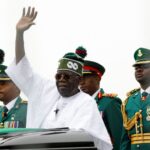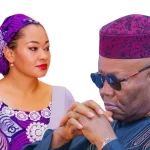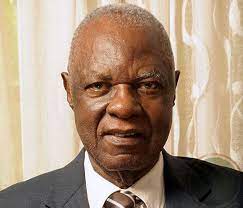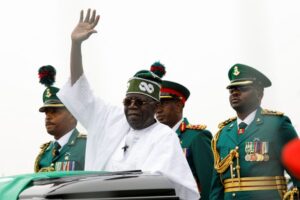Nigeria’s democracy and judiciary both are “going in the wrong direction again now,” laments another retired Supreme Court Justice, echoing the valedictory speech of Justice Dattijo Mohammed on October 27 that some reform can begin immediately within the justice system even before a holistic law amendment to salvage it.
James Ogebe, 83, who retired from the top court in 2010, is scathing in his view of the judiciary, that “in recent times, the progress and developments in our electoral and democratic jurisprudence have been reversed and we see settled issues being relitigated or abuses being re-enacted by unscrupulous political actors.”
He said Nigeria’s judiciary is derailing again from the vision of Nelson Mandela of universal justice for all of mankind, not justice limited to just one issue or to one corner of the world.
Ogebe was extolling the virtues of the late South African President at the Nelson Mandela 10th Memorial Lecture in Abuja.
He recounted how this major judicial upheaval in Nigeria began in the 1990s, around the time Mandela was released from prison by White supremacists in South Africa as Moshood Abiola was being sent to jail in his own country by dictator Sani Abach, a fellow Black man.
“We must ask ourselves why he [Mandela] survived 27 years imprisonment from White South Africans while Moshood Abiola did not survive five years imprisonment by his own brothers.”
READ ALSO
Appeal Court jurist, Shagbaor Ikyegh, is dead
Ogebe also noted “in recent times, the progress and developments in our electoral and democratic jurisprudence have been reversed and we see settled issues being relitigated or abuses being re-enacted by unscrupulous political actors.”
He said, as part of the ways to rescue the judiciary, “I want to recommend the suggestion of Prof Farooq Kperogi who submits that courts be restricted to reruns and not awards of elections to parties. This is one way to make peoples’ votes count instead of judges’ votes.
“I also reecho the call of my learned brother Justice Dattijo Muhamed in his recent valedictory calling for a bifurcation of the chair of NJC and FJSC from the office of the CJN.
“The danger is where you have a bad actor at the center, all three institutions will be dysfunctional but splitting it increases the prospects for a good actor in one or the other.”
Ogebe’s full speech is reproduced below:
Mandela’s vision
One of the critical aspects of Mandela’s vision of justice is its accessibility. Justice that is distant, complex, or expensive is justice denied.
Mandela’s autobiography was fittingly called “Long Walk to Freedom” encompassing his decades long quest for democracy and equality while by contrast Nigeria’s story today seems to be quite the opposite fittingly described as a “Fast walk from freedom” democracy, equality and Justice in our own dear native land.
Mandela’s vision of justice went beyond the narrow confines of legal frameworks. He championed a justice steeped in fairness, equality, and the unwavering protection of human rights. His legacy challenges us to build societies that reflect these ideals, where justice is not a privilege of the few but a fundamental right of all.
In present day Nigeria, the political class’ cases fasttrack through the courts while cases of ordinary citizens suffer preposterous delays. Some reports say a case spends 30 years in the court system. Appeals being heard now were filed 10 years ago.
Appeal Court shenanigans on the plateau
This year the Supreme Court has practically heard only political cases.
But even then, a copy of Plateau state’s election judgment at the court of appeal was reportedly not available till the time for appeal almost ran out and a party in the presidential election lamented that they had not received a CTC [certified true copy] of their judgment about a month after.
If justice delayed is Justice denied then what is the effect of a judgment of national import not being readily available for scrutiny in a heated polity?
For a society to be fair, its legal and judicial systems must be transparent, efficient, and accessible to everyone, especially the most vulnerable and marginalized.
It means guaranteeing the independence of the Judiciary, the transparency, fairness, and impartiality of the Justice system, an accessible and fair legal system, ensuring that unnecessary complexities do not bog down judicial processes, and ensuring that justice is timely.
Dating back to the Abacha era
In the ‘90s, when I was in the court of appeal, we granted Moshood Abiola bail in his treason trial. It was clear to us that Abiola was not a threat to national security and indeed had a prima facie bona fide claim of right to the presidency on the basis of one of Nigeria’s most credible elections.
However, the [Sani] Abacha regime appealed to the Supreme Court, then refused to appoint new justices who could hear the appeal, increased the retirement age for retiring justices so the court would not collapse. This was one of the worst systemic attacks on the court.
Incidentally, the court is today at a similar point of asphyxiation with an inability to constitute two simultaneous panels (full court and regular panel) with only nine justices and CJN.
Ironically at the same time the bail granted to Abiola was being frustrated by the army regime [in Nigeria], Mandela was being released from jail [in South Africa] by the white apartheid regime from where he ultimately won election to the presidency.
So, in the 90s, we witnessed the ultimate political paradox that a prisoner became president-elect in a country that was constitutionally racist and a putative president-elect became a prisoner in a country with constitutional equality.
Nigeria was going in the wrong direction then and after a brief period of course correction in our 1999 return to democracy, some would argue is going in the wrong direction again now.
Transcending legal frameworks – a vision of inclusive justice
Mandela’s vision of justice considers the rule of law as a cornerstone of a just society. It ensures that laws are applied fairly and consistently, with no individual or group being above them.
Upholding the rule of law without prejudice requires an independent judiciary, a transparent legal system, and a commitment from every arm of government to abide by and enforce the law. It also requires a vigilant and informed citizenry that holds its leaders and institutions accountable.
Mandela’s vision of justice transcended mere legalism. It was not confined to the letter of the law but was deeply intertwined with the spirit of humanity.
He envisioned a world where justice served as a guiding principle, ensuring that everyone, regardless of their background, had equal access to the rights and protections they deserved.
His struggle was not just for the liberation of South Africa from the clutches of apartheid but for the establishment of a global society where fairness and equality were the norms.
In recent times, the progress and developments in our electoral and democratic jurisprudence have been reversed and we see settled issues being relitigated or abuses being re-enacted by unscrupulous political actors.
Attacks on sitting governors like we saw in the Ngige saga in Anambra state are back. Sponsored impeachments, ghost chief executives remotely ruling and armed clashes between security services are just a few examples of the trenchant anarchy destabilizing the rule of law.
Mandela’s “great legacies”
Perhaps two of the great legacies of Mandela that we enjoin Africa’s rulers to emulate are (1) Magnanimity in victory and (2) Relinquishment of power.
Mandela served as president to steady the ship of state in the transition to one-man-one-vote inclusive and participatory democracy.
But he served only one term to allow young blood to better benefit his new nation.
In Nigeria, the same individuals have gravitated around the corridors of power vacillating from one party to another and inundating the courts in desperation for power for decades.
Concurring with Kperogi on splitting up the offices of NJC, FJSC, CJN
In conclusion, I want to recommend the suggestion of Prof Farooq Kperogi who submits that courts be restricted to reruns and not awards of elections to parties. This is one way to make peoples’ votes count instead of judges’ votes.
I also reecho the call of my learned brother Justice Dattijo Muhammed in his recent valedictory calling for a bifurcation of the chair of NJC and FJSC from the office of the CJN.
The danger is where you have a bad actor at the center, all three institutions will be dysfunctional but splitting it increases the prospects for a good actor in one or the other.
Concurring with Odinkalu on quality and calibre of Judges
Finally, I endorse calls for improvement in the quality and caliber of judicial appointments as have been made by Prof [Chidi] Odinkalu amongst others. I have long maintained that while Federal Character ensures fair representation, it should not be the sole consideration.
There should be excellent judicial acumen and productivity slots in addition as well. If we can have slots reserved for sharia and customary law justices, why not have same for outstanding legal minds also?
As we mark the 10th Memorial of Mandela’s demise, we must ask ourselves why he survived 27 years imprisonment from White South Africans while Moshood Abiola did not survive five years imprisonment by his own brothers.
We must not become our own worst enemies.
May God bless Nigeria and May Africa honor the legacy of the great Madiba!
– Hon. Justice J.O. Ogebe JSC (Rtd)








More Stories
New Research exposes China’s significant leverage on Nigeria, influence on country’s Cybercrime Act, other policies
Natasha vs Akpabio: Police arrest whistleblower over alleged defamation of Sandra Duru
FG files criminal defamation charge against Natasha, lists Akpabio, Yahaya Bello, Sandra Duru, others as witness